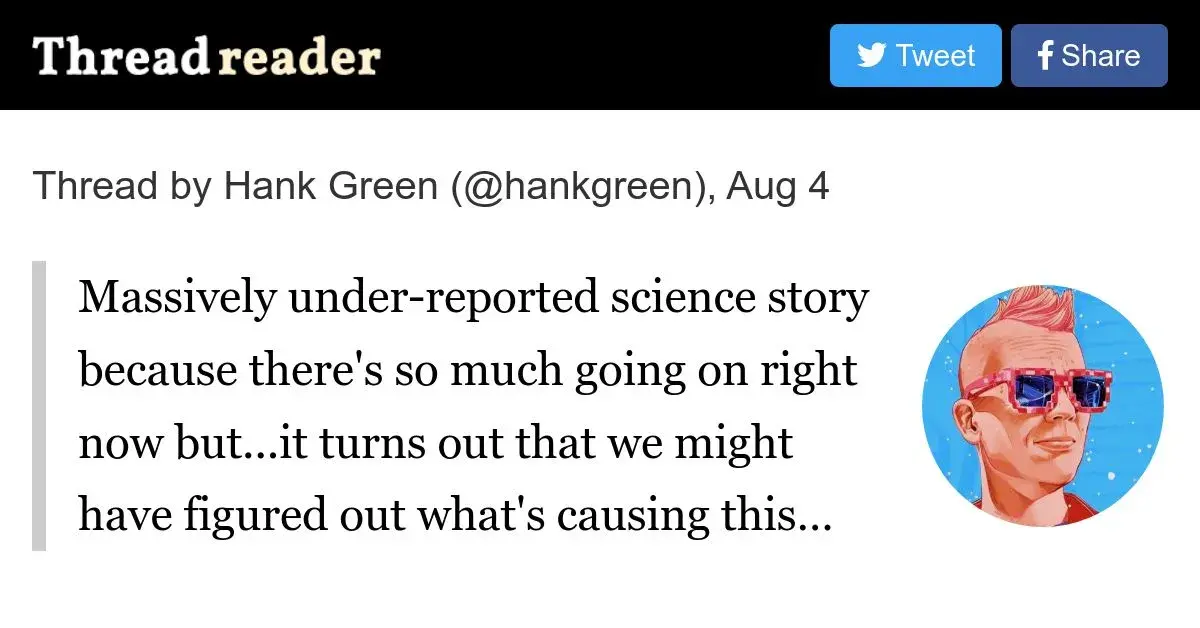Scientists have discovered that the recent spike in global temperatures may be caused by a reduction in sulfur dioxide pollution from shipping vessels. Ships have long emitted sulfur dioxide, which cools the planet by seeding clouds and reflecting sunlight. However, new regulations that limit sulfur in ship fuels took effect in 2020, leading to a loss of this cooling effect equivalent to a large volcanic eruption each year. Models show this reduction in sulfur dioxide pollution can explain the extra warming seen in the North Atlantic. While pollution is bad, the new regulations provide a natural experiment that gives insight into how intentional geoengineering could potentially combat climate change in the future.
My fear with geoengineering is that is allows us to become complacent about solving the primary problems, and then also creates its own set of unexpected secondary problems.
At least to your second point, in the video he explains that there are ways to seed clouds for cooling purposes without any major side effects, and the experiment hes talking about is that this shows it can be done on a large scale. Whether it would make us complacent on getting CO2 out of the air, though, it might but at least it would be the start of a solution.
Hank also says that we’re at point where we need to cut emissions AND carbon capture AND geoengineer in order to mitigate climate disaster. It can’t be a one and done solution anymore, we’re beyond that
And considering we are at risk for loosing tons of biodiversity in the oceans from this heating (see mass coral bleaching event in florida) I think we have to start seeding clouds and whatever mitigating factors we can
Right, but their point was kind of about side-effects we’re not aware of at the time. So that’s kind of the entire point, that we think there are no negative side effects only to later find out we were wrong.
So that doesn’t really address what they said at all.
Exactly this. We think we know everything when we start doing stuff. But after a while we found out we where wrong and fucked up.
We don’t fully understand/comprehend nature and how it all interacts. We shouldn’t be so ignorant to think we do understand it.If only we were allowed to study this approach without so much immediate reflexive opposition.
Sounds like something China can pioneer and that the West will adopt a decade or so later after China shows it really does have no major side effects.
A while back there was a round of interest in the possibility of countering global warming by using specialized high-altitude planes to spray calcium carbonate particulates into the upper atmosphere, and it was calculated that global warming could be countered with an ongoing expenditure of $2 billion per year. That’s peanuts for a country like China, so if climate change starts causing them significant identifiable losses I wouldn’t be at all surprised if they gave it a go.
It already is, looking at recent flooding.
become complacent about solving the primary problems
We have been complacent about solving the primary problems for decades. At this point we should be doing all we can, and if a way to combat the symptoms gives us more time to finally get our shit together and do something useful before everyone turns into doomers giving up because it’s too late anyway then I think that’s a good thing.
You think we can solve primary problems? Cause all I see is us driving off a cliff. If we aren’t willing to hit the breaks I’ll settle for turning the car into a bush
Have to pave the road as we go. No turning back.
There’s a spin campaign going on around this, just fyi. I don’t see it at play here. But there are neolib think tanks pushing the idea that:
Reductions in SOx emissions due to recent regulations are causing additional warming
while the truth is:
Reductions in SOx emissions due to recent regulations are exposing warming that is already here
When you look at it like this, you can see that SOx emissions aren’t a solution. In fact there is a very good reason these emissions were regulated. It’s because it causes acid rain and ocean acidification. Certainly, we don’t want to increase SOx emissions to further mask the warming in the atmosphere, because the oceans turning too acidic is also an existential threat. And acid rain has a real cost to society. In fact this was all driven by EU regulations, and recently they looked into the data of what the SOx emission reductions were doing in terms of warming, and came to the conclusion that the acidifying effects of SOx were far worse compared to the warming effects and that the regulations were still a good idea.
You might have heard SOx proposed for counteracting the warming effects of GHG. I think that’s probably not a good idea, but I support as much research as we can muster into these things. My understanding is that CaCO3 has a far more favorable profile than SOx. Personally I am far from comfortable with the amount of confidence we have in the adverse effects of this technology but I also believe that desperate countries are going to take desperate actions regardless.
This guy proposes using seawater. That’s an interesting idea. I’m not going to watch the video and the details aren’t in the text, but I’m not sure what exactly he is proposing and based off of what studies. He may be talking about doing this at a lower altitude for a certain effect, but in general water vapor is a key GHG.
Hank Green has a video about this and maybe we can safely replicate the sulfur dioxide’s effects by shooting sea water into the air.
OPs link is Hank’s “blog post” about that video, he links to it in the article.
I wonder if there is a solution that involves a less dangerous gas instead of sea water. Spraying large volumes of water into the stratosphere is not really possible yet, so if it just rose as a gas it would be more doable.
A while back there was a round of news suggesting calcium carbonate particulate stratospheric injection would be a good substitute for sulfur dioxide.
For a second I thought you were calling sea water a dangerous gas.
I’m not sure that spreading salt is a good idea when you consider that salt kills life when you spread it on land.
I think the idea is to do it over oceans.
But then we’ll get salt in the oceans and kill all the fish.
We sprayed it outside the environment.
We’ll noclip out of the map and spray it out of bounds
How certain could we be of where these clouds would fall once they were created?
A good question, I’m not an expert on this unfortunately. A quick google search did not reveal any answers.
Step Two: Harvest giant ice cube from a comet and drop it in the ocean every few years
Like the one daddy puts in his drink! …and then he gets mad
Solving the problem once and for all!
Once and for all I said!
Fascinating. Termination Shock by Neal Stephenson deals with the same Sulphur as a way to combat global warming.
Came here to say this. Highly recommended book.
Got my idea to build the torment nexus from the hit sci-fi novel “Don’t Build the Torment Nexus”.
This is the primary component in producing acid rain, right?
Correct
Hear me out guys, why don’t we just put a giant ice cube in the ocean to combat rising temps?
Thus solving the problem once and for all!
But-- ☝️
–ONCE AND FOR ALL!
Randall Munroe would like to have a word with you:
Interesting vox video about geoengineering. I find the coalition of scientists demanding we don’t even look at geo eng tech, like zero research into it frustrating. https://youtu.be/EKPFZPyQurA
Indeed. There are people who wail and lament about how we’ve passed a “tipping point” and the climate is doomed to catastrophic warming no matter how much our emissions are reduced at this point, and then when you bring up the possibility of studying geoengineering they snap back at you with a “but not like that” reflex.
Frankly, I think there are environmentalists who like the notion of inescapable doom. It gives them an “I told you so” feeling of victory, perhaps, or absolves them of any further effort. Or they’ve decided humanity is evil and deserves to be “punished.” I don’t know, it’s just so wearying trying to deal with that reaction.
At the end of the day, when major governments are faced with the choice of collapsing under a wave of migrants and famine and taking a stab at spraying some aerosols into the upper atmosphere as a hail Mary, they’re going to try the thing that isn’t guaranteed disaster. Would be nice if we could do some studying of it first.
Change is hard, much better to keep doing something that doesn’t work.
Fascinating. I heard something similar with particle pollution in big cities.
Geoengineering is a huge gamble and I want humanity to take it…
Me too, and quickly.
If certain scientists believe they can turn such an inhospitable planet as mars into a liveable environment…why can’t we fix up earth?














